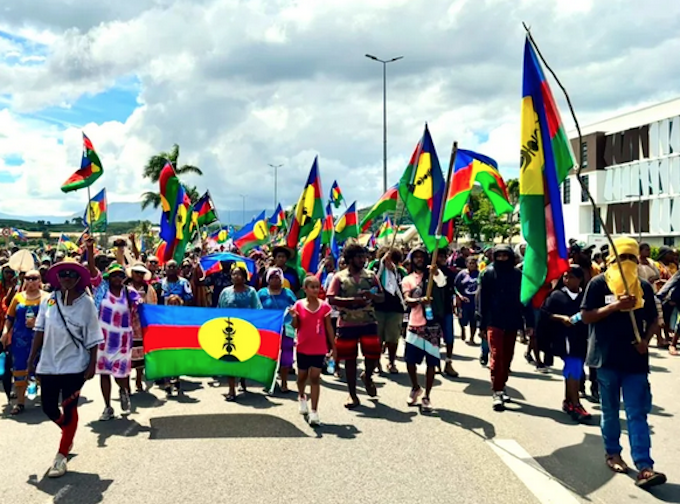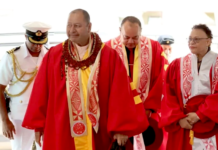
By Patrick Decloitre, RNZ Pacific correspondent French Pacific desk
Demonstrations have been held in New Caledonia — with more protests expected — from both pro- and anti-independence supporters after the French Senate endorsed a constitutional amendment bill to “unfreeze” the French Pacific territory’s electoral roll.
The Senators endorsed a move from the French government to allow French citizens to vote at local elections, provided they have been residing for at least 10 uninterrupted years.
The Senate vote will be followed by a similar vote in the French National Assembly (Lower House) on 13 May.
In June, both Houses of Parliament (the Senate and National Assembly) will gather to give a final green light to the text with a majority of two-thirds required for it to pass.
The Senate vote in Paris on Tuesday has since triggered numerous reactions from both the pro-France and the pro-independence parties.
Southern Province president and leader of the pro-France party Les Loyalistes, Sonia Backès, hailed the Senate’s decision, saying it came “despite strong pressures from the pro-independence parties”.
She said “we have to stay mobilised” in the face of the two other planned votes in the next few weeks, she said, announcing more demonstrations from the pro-France sympathisers, including one next Saturday.
Counter protests
On March 28, both pro-France and pro-independence militant supporters gathered in the thousands in downtown Nouméa, only a few hundred metres away on opposite sides of Nouméa’s iconic Coconut Square (now renamed Peace Square) — one in front of the Congress, the other in front of the local government’s building.
The marches each gathered more than 10,000 supporters under strong surveillance from some 500 police and security forces, who ensured the two crowds did not clash. No significant incident was reported.
Several officials have taken to social media to comment on the issue.
New Caledonia constituency’s MP in the National Assembly, Nicolas Metzdorf, posted that the electoral roll changes were “a national and international legal obligation” and “those who are calling [New] Caledonians to take to the streets to oppose this are taking a considerable risk”.
Pro-France Rassemblement (local) Congress caucus president Virgine Ruffenach posted: “We are engaged in a struggle for justice, for a democratic Caledonian society which respects international rules and does not reject anyone.”
French Home Affairs and Overseas Minister Gérald Darmanin, who initiated the constitutional amendment, wrote that the French government “remains more than ever open to a local agreement and has a mechanism in place that will allow to take the time to finalise it”.
Darmanin was referring to a related political issue — the need, as prescribed by the 1998 political Nouméa Accord, for all parties to meet and inclusively arrive at a political agreement regarding New Caledonia’s future.
The agreement is supposed to replace the Nouméa Accord and, in order to allow more time for those talks to produce some kind of a joint text, the dates for this year’s provincial elections have been postponed from May 2024 to December 15, 2024 “at the latest”.
‘Strong message to Paris’
On the pro-independence side, FLNKS-Union Calédonienne Congress caucus president Pierre-Channel Tutugoro conceded that the Senate vote’s results were “something to be expected”.
“Now we’re waiting for what comes next [the National Assembly and French Congress votes] and then we’ll know whether things will eventuate,” he said.
The Union Calédonienne, one major component of the four-party pro-independence FLNKS, has in a few months revived a so-called CCAT (Cellule de Coordination des Actions de Terrain, or Field Action Coordination Cell).
The CCAT, consisting of non-FLNKS pro-independence parties and trade unions, has since organised several demonstrations, including one on March 28 and the latest on April 2, the day the Senate vote took place.
This week, CCAT claimed it managed to gather about 30,000 participants, but the French High Commission’s count was 6000.
Reacting to the Senate vote on Wednesday, CCAT head Christian Tein announced more protest marches against the “unfreezing” of the electoral roll were to come . . . the next one being as soon as April 13 “to keep on sending a strong message to Paris”.
Tein said the march was scheduled to take place on Nouméa’s central Peace Square.
The protesters once again intend to ask that the French government withdraw its text, claiming the French state is no longer impartial and that it is trying to “force its way” to impose its local electoral roll change.
The same date was also chosen by pro-France leaders and sympathisers who want to make a demonstration of force to show their determination to have their voting rights recognised through this proposed constitutional amendment.
PALIKA to ‘review strategy’
Meanwhile, another major component of the FLNKS, the Kanak Liberation Party (PALIKA), held its general assembly last weekend.
Its spokesman, Jean-Pierre Djaïwé, told a news conference that PALIKA, while deploring that New Caledonia’s politics had significantly “radicalised”, was now considering “reviewing its strategy”.
He said PALIKA and FLNKS, who recently have displayed differences, must now reaffirm a strategy of unity and “the pro-independence movement’s will to work towards a peaceful future”.
“There’s no other alternative,” he said.















































